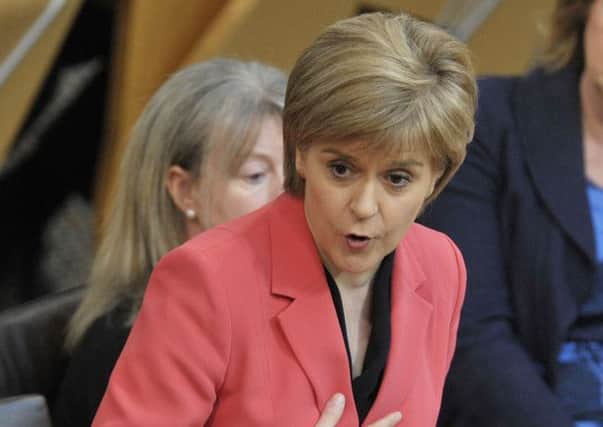Leaders: Sturgeon’s line on abuse is admirable


But it was accused of undermining the right to free speech, and of unnecessarily criminalising a certain kind of football fan.
During the independence referendum, the party under Alex Salmond’s leadership seemed less than willing to acknowledge that the bulk of the abuse generated on social media emanated from Yes supporters.
Advertisement
Hide AdAdvertisement
Hide AdThis was undoubtedly the case, but Mr Salmond and the Nationalists in general preferred to couch any criticism of abuse in general terms, condemning such behaviour from whatever side of the debate it came.
Many observers rightly regarded such a stance as weasel words.
So it is good to see the current SNP leader and First Minister, Nicola Sturgeon, take a firm line against a party member whose Twitter feed was used to launch a vile homophobic attack on Ruth Davidson, the Scottish Conservative Party leader.
The party member in question has had his membership suspended.
We trust that after due process it will also be cancelled.
The First Minister has shown herself willing to intervene, in a very forthright condemnation, even if it means a public rebuke to a party member whose behaviour is beyond the pale.
She has also used her personal Twitter account to come to the defence of political journalists who were being verbally abused on social media by independence supporters.
And she acted swiftly to suspend the Renfrewshire councillors who filmed themselves burning the Smith Commission report.
When Ms Sturgeon was elected SNP leader last year she made a point of saying she hoped to strike a different tone to her predecessor. In fact her candour in setting out what she sees as the differences in approach between herself and Mr Salmond has been striking.
Advertisement
Hide AdAdvertisement
Hide AdShe has described herself as someone more willing to seek consensus across political boundaries than the famously combative Mr Salmond.
The fact that she also seems more willing to be seen to be keeping her own party in line is a welcome new approach.
The personal affinity she clearly has with Ms Davidson and Kezia Dugdale, the Scottish Labour deputy leader, as women in political life, is a further example of a new broom at work.
Ms Sturgeon’s willingness to publicly criticise her own party members gives out a message that she is her own woman.
That independence of mind, and security in her own position at the apex of the Nationalist movement, is a key reason opinion polls put her personal approval ratings at such a high.
Tories must come clean on welfare
When George Osborne sat down after making his Budget statement on Wednesday, attention inevitably focused on the Treasury giveaways in the form of income tax cuts, incentives for first-time buyers and help for savers.
It was not until the number crunchers had spent 24 hours going through the detail that the clear picture of the winners in this Budget was complemented with a clear picture of the losers.
The country’s leading financial think tank, the Institute for Fiscal Studies, yesterday pointed out that of the £12 billion in welfare cuts contained in the Chancellor’s strategy for the next parliament, there were only detailed plans for achieving £2bn of them.
Advertisement
Hide AdAdvertisement
Hide AdWhich poses the question: where does the Conservative party intend to find that additional £10bn?
The past five years have seen an unprecedented squeeze on welfare payments.
The focus on welfare was a legitimate one – the system did little to reward those unemployed claimants who actively sought work, and there were insufficient checks on those claiming incapacity benefits for long periods of time.
But the blunt way Cameron’s administration went about this difficult task was insensitive and uncaring, culminating in the Dickensian monstrosity of the bedroom tax.
Voters in the forthcoming general election have a right to know what kind of Britain they will get if they choose the Conservatives.
And they have a right to know how Mr Osborne intends to squeeze more money out of the poorest and most vulnerable people in Britain.
FOLLOW US
SCOTSMAN TABLET AND MOBILE APPS